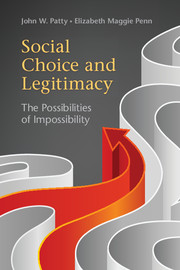7 - Theory and Method
Published online by Cambridge University Press: 05 August 2014
Summary
As noted in the introduction of this book, our theory is not intended to be predictive. Much of modern social science research centers on an idealized version of the scientific method in which a model is built on first principles, predictions are derived from this model, and these predictions are then subjected to empirical verification. The driving force in this approach is falsification: while a theory can rarely if ever be shown to be true, sufficient empirical data can conclusively reveal if the theory is false.
While Arrow's Theorem has served as the principal theoretical motivation for our theory, we note again that our main results have more in common with Nash's Theorem (Nash, Jr., 1950) than with Arrow's. In the preceding chapter, we established that our notion of legitimacy is theoretically nonvacuous for any principle p, and we characterized the types of decisions that satisfy it. Note that, just as the Nash equilibria of a game are entirely determined by the preferences of individuals, the choices (and decision sequences) that satisfy our notion of legitimacy are entirely determined by the principle by which choice is intended to be structured, p. Neither Nash equilibrium nor our theory of legitimacy provide any guidance about either what the primitives (preferences or principles, respectively) are from an empirical perspective or even about how these primitives “should” be configured.
- Type
- Chapter
- Information
- Social Choice and LegitimacyThe Possibilities of Impossibility, pp. 121 - 128Publisher: Cambridge University PressPrint publication year: 2014



